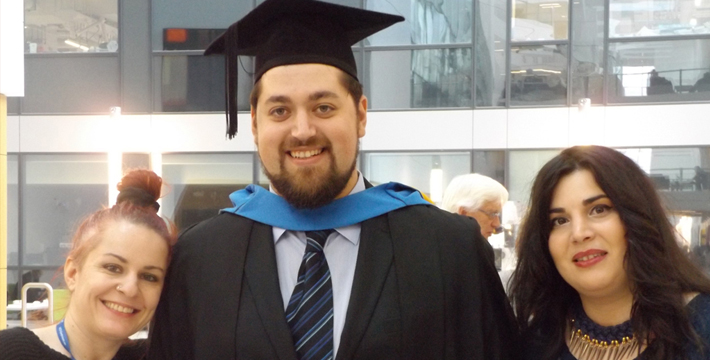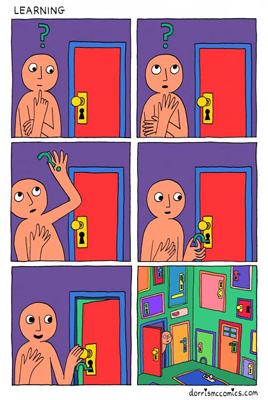
5 tips for effectively pursuing a master's degree in technology
For tech professionals, there are plenty of reasons to pursue a master’s degree. Despite that these reasons vary from person to person, most of them typically revolve around building a fulfilling career.
There are countless debates on whether such a degree can still contribute towards that objective, or it has simply become a costly check box in the human resources process. That’s a legitimate concern which stems from a fact that Robert C. Martin describes as follows:
I think it is possible to get an excellent education at a university. It’s just that I also think it’s possible to wiggle yourself through the system and come out with a diploma, and not much else. – Robert C. Martin, from The Clean Coder (Amazon affiliate link)
In other words, it’s the learning process that matters, not the degree per se. Success doesn’t come by chance, but rather it can be engineered by defining specific goals and adopting an apt strategy to accomplish them. Don’t be mistaken, there’s extensive effort involved in that process.

Therefore, depending solely on your approach, university studies can either be a life-changing experience or a total waste of time and money. This article aims to help you focus on achieving the former, while pointing out some common pitfalls that might push you towards the latter.
1. Choose a master’s program carefully
The first and most important step is choosing a master’s degree tailored to your own goals and prior experience. It’s vital to invest some time and conduct a proper research on your potential options.
That research should obviously include, but not be limited to, a visit on each school’s website. During that phase beware of the sales pitch! Be cautious and read between the lines, as the real value of what they offer might be entirely different from what they advertise.
It is also highly recommended that you get in touch with at least a few graduates of the programs you are interested in (thanks LinkedIn) and get some feedback about their studies. Just keep in mind that any opinion might be biased.
Whatever your choice is, make sure that you’re absolutely happy with it. If you feel like you’re compromising, consider it a red flag.

2. Prepare to step out of your comfort zone
In contrast with bachelor’s degree studies, instead of passively following a learning plan with specific instructions, it’s expected that you take initiative and directly influence the outcome of your learning experience. You will have to pick electives, come up with project ideas, team up with other students, make presentations, and most importantly, manage your time efficiently to always deliver in time.
You might feel overwhelmed by that shift in responsibilities, and you might be tempted to try to follow the easiest path possible. For example, you could pick the easiest electives, uptake trivial projects involving problems that have already been solved over and over again, let your team handle most of the work, and avoid presentations whenever possible, or even include every single line in the slides and simply start reading to your audience. You would still get a degree, but its true value would be close to none.
Are you nervous about giving presentations? Do you have problems when working with a team? Is there a great project idea that you would like to work on, but it seems difficult? If something makes you feel uncomfortable, do it more, and fix the problems that make you feel that way. Take good advantage of the controlled environment called a classroom to improve your skills and become a better professional.
I’m not telling you it’s going to be easy - I’m telling you it’s going to be worth it. – Art Williams
3. Keep an open mind about technology
Despite your personal preferences on operating systems, platforms, programming languages, frameworks etc, there is a good chance that during your studies you will have to work with some piece of technology you haven’t got any experience in, or you don’t particularly like. I’ve seen many students trying to avoid such situations, or even attempt to convince their teachers to let them work with some other technology they are more comfortable with. I believe that’s a costly mistake.
I suppose it is tempting, if the only tool you have is a hammer, to treat everything as if it were a nail. – Abraham Maslow, Law of the instrument
Solving problems using a technology that you are little or no familiar with can greatly improve your skills in the technologies of your preference. This correlation is not quite obvious, that’s why so many people fall into the trap of not even trying. It’s not about learning the next hot programming language that everybody talks about, but rather about expanding your ability of perception and being able to think outside of your typical thought patterns.

4. Prefer team projects over solo work
Although a stereotype with many exceptions, we technologists haven’t chosen this line of work because we are great with people. Most of us prefer to intensely focus on the task at hand, while effectively handling multiple concepts at the same time. Avoiding to deal with the complexities of human interaction usually plays an essential role for having our peace of mind. The truth is that no significant technological advancement has ever been achieved with solo work, yet we keep falling into the same trap of overprotecting our ego.
Having said that, University is the ideal place to improve your teamwork skills. Your success in the industry depends heavily on it, so don’t throw such an opportunity away. And yes, you might end up doing more work in comparison to a solo project, mostly because team members can easily let you down, but that’s not different with what actually happens in the industry. Just make sure that you do your best, take initiative, play an active role on the project organization, and never be the one who lets the others down.

5. Enjoy the process
University won’t give you the answers to every question, but it will teach you how to ask the proper questions while promoting critical thinking, given that you are willing to walk that path. In order for this to happen, you will undergo an intensive process which will transform you to a better version of yourself, one brain cell at a time.
You don’t have to see the whole staircase, just take the first step. – Martin Luther King Jr.
Of course, there will be times when you will feel physical and mental depletion, anger, or disappointment. It would be unrealistic to expect to enjoy the process every single day. Nevertheless, it’s important to stay focused on the positives and keep working on the things that add up to your success. Remember that the more often you do enjoy the process, the better the results will be.
Become a DrinkBird Insider
Never miss a post! Get the latest articles on tech and leadership delivered to your inbox. Sign Me Up Sent sparingly. Your privacy is a priority. Opt-out anytime.
Recommended Books
Full disclosure: the following are Amazon affiliate links. Using these links to buy books won't cost you more, but it will help me purchase more books. Thank you for your support!






